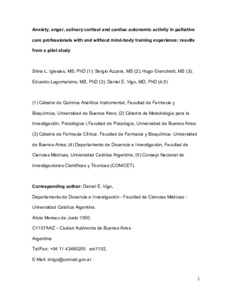Por favor, use este identificador para citar o enlazar este ítem:
https://repositorio.uca.edu.ar/handle/123456789/10350| Título: | Anxiety, anger, salivary cortisol and cardiac autonomic activity in palliative care professionals with and without mind-body training experience : results from a pilot study | Autor: | Iglesias, Silvia L. Azzara, Sergio Granchetti, Hugo Lagomarsino, Eduardo Vigo, Daniel Eduardo |
Palabras clave: | ESTRES; ANSIEDAD; CUIDADOS PALIATIVOS; CUIDADORES; HIDROCORTISONA; ACTIVIDAD AUTONOMA; PROMOCION DE LA SALUD | Fecha de publicación: | 2014 | Editorial: | Elsevier | Cita: | Iglesias, Silvia L., et al. Anxiety, anger, salivary cortisol and cardiac autonomic activity in palliative care professionals with and without mind-body training experience : results from a pilot study [en línea]. Postprint de artículo publicado en European Journal of Integrative Medicine. 2014, 6 (1). doi:10.1016/j.eujim.2013.11.004. Disponible en: https://repositorio.uca.edu.ar/handle/123456789/10350 | Resumen: | Abstract: Palliative care practitioners suffer a considerable burden of stress. Although it is not possible to eliminate stress entirely, people can learn to manage it. Mind/Body intervention help individuals turn maladaptive responses to stress into more adaptive ones. The aim of the study was to assess the impact of mind body techniques in a group of Palliative Care professionals. Methods: We investigated anxiety, anger, baseline salivary cortisol levels immediately after awakening and autonomic nervous system activity in a group of health care professionals from a Palliative Care Unit (n = 22). In addition, we assessed the autonomic response to relax instructions. The participants were divided into two groups according to their regular practice of mind-body techniques.Results: No significant differences between groups were found for anxiety and anger. Baseline salivary cortisol levels were significantly greater in the untrained group (5.23 ± 5.16 μg/dl) when compared with the trained one (0.57 ± 0.19 μg/dl) (Mann-Whitney U Test = 0; p < 0.001). When comparing heart rate variability (HRV) values during relaxation with HRV values at rest within each group, trained subjects showed a significant increase in LF% (z = -2.073, p = 0.038), while untrained subjects showed a significant increase in HF% (z = -2.100, p = 0.036). Conclusions: Subjects who regularly practice mind-body techniques evidenced lower baseline morning cortisol levels and achieved a differential autonomic response to relax instructions. | URI: | https://repositorio.uca.edu.ar/handle/123456789/10350 | ISSN: | 1876-3820 (impreso) 1876-383 (online) |
Disciplina: | MEDICINA | DOI: | 10.1016/j.eujim.2013.11.004 | Derechos: | Acceso abierto | Fuente: | Postprint de artículo publicado en European Journal of Integrative Medicine. 2014, 6 (1) |
| Aparece en las colecciones: | Artículos |
Ficheros en este ítem:
| Fichero | Descripción | Tamaño | Formato | |
|---|---|---|---|---|
| anxiety-anger-salivary-cortisol.pdf | 166,89 kB | Adobe PDF |  Visualizar/Abrir |
Visualizaciones de página(s)
291
comprobado en 13-feb-2026
Descarga(s)
321
comprobado en 13-feb-2026
Google ScholarTM
Ver en Google Scholar
Altmetric
Altmetric
Este ítem está sujeto a una Licencia Creative Commons

